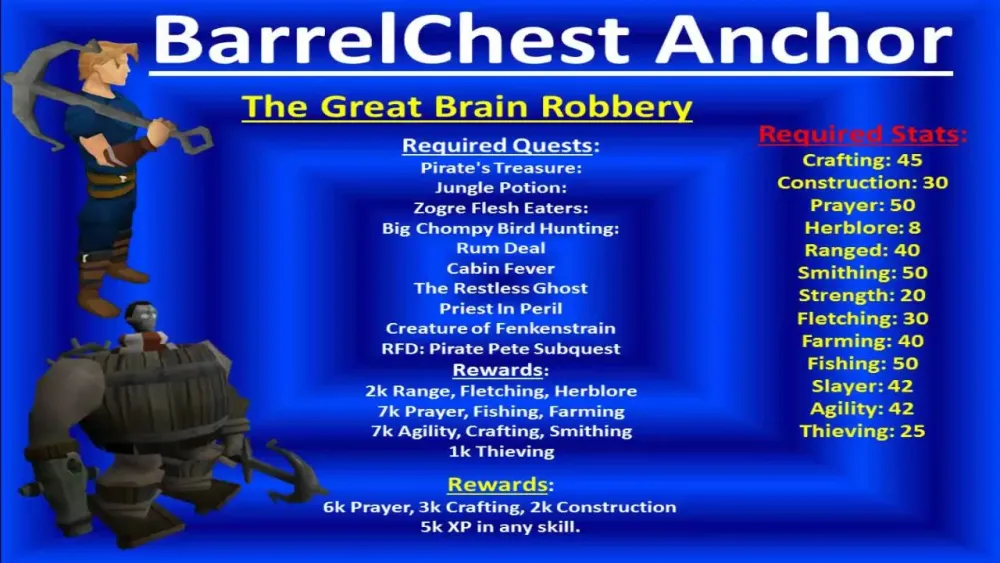Your cart is empty
Complete Guide to All Quest Requirements in OSRS

Warning: Undefined variable $post in /home/osrsmoneymaking.guide/public_html/wp-content/themes/kadence/functions.php on line 391
Warning: Attempt to read property "ID" on null in /home/osrsmoneymaking.guide/public_html/wp-content/themes/kadence/functions.php on line 391
Old School RuneScape (OSRS) offers a vast world filled with quests that enrich the gameplay experience. Quests provide players with unique storylines, characters, and rewards, enhancing their skills and unlocking new content. Understanding the various quest requirements is crucial for players looking to complete these adventures efficiently. This guide will delve into the foundational aspects of OSRS quests, helping players navigate their journey through Gielinor.
Quest requirements in OSRS can be categorized into several types, including skill levels, item requirements, and completion of other quests. Each quest has its own set of prerequisites that players must meet before they can embark on the adventure.
Skill level requirements are often the most common barrier to entry. Many quests require a certain level in skills such as Attack, Magic, or Crafting. These levels must be achieved through training, which can involve grinding out experience points in various activities. Players should check the specific skill levels needed for each quest in advance to avoid unnecessary delays.
Item requirements are another significant aspect of quest preparation. Some quests necessitate specific items for completion, including weapons, armor, or quest items unique to previous quests. Players should gather these items beforehand or know where to acquire them quickly. It’s advisable to maintain a well-organized bank where commonly used quest items are stored to minimize time spent searching during questing.
Additionally, many quests require the completion of other quests as prerequisites. This interconnected quest system encourages players to explore multiple storylines and gain a deeper understanding of the game’s lore. Completing earlier quests not only helps in meeting requirements but also often grants valuable rewards that can aid in subsequent adventures.
Finally, some quests have unique requirements, such as certain events or mini-games that must be completed. Players should familiarize themselves with these requirements by consulting quest guides or the OSRS Wiki to ensure they are prepared for the challenges ahead. Keeping track of all these requirements is essential for efficient questing and helps players make the most of their time in Gielinor.
3. Beginner Quests: Requirements and Tips

Starting your journey in Old School RuneScape (OSRS) can be thrilling, especially with the beginner quests that introduce you to the game’s mechanics and lore. These quests are designed for new players and generally have low-level requirements, making them accessible and enjoyable.
Here’s a list of the most common beginner quests along with their requirements:
- Cook’s Assistant: No skill requirements. You’ll need to gather some ingredients for the Cook in Lumbridge.
- Sheep Shearer: No skill requirements. You simply need to shear some sheep for the farmer.
- Restless Ghost: No skill requirements. This quest involves helping a ghost find peace.
- The Lost Tribe: No skill requirements. You’ll be helping a tribe of gnomes.
*Tips for completing beginner quests:
- Explore the Map: Familiarize yourself with the game’s layout. Knowing where to find key locations can save you a lot of time.
- Talk to NPCs: Engaging with non-player characters (NPCs) often provides hints and information crucial for completing quests.
- Use Guides: If you’re stuck, don’t hesitate to check online guides or videos. They can provide step-by-step assistance.
- Join a Community: Engaging with other players can be incredibly helpful. They can offer tips and share their experiences.
These beginner quests are not just essential for leveling up; they also introduce you to the rich storytelling and vibrant world of OSRS!
4. Intermediate Quests: Requirements and Strategies

Once you’ve completed the beginner quests and feel comfortable navigating the world of OSRS, it’s time to dive into intermediate quests. These quests typically require higher skill levels and often involve more complex tasks, but they offer greater rewards and deeper lore.
Here’s a list of popular intermediate quests with their requirements:
- Dragon Slayer: Requires 32 quest points, 30 Attack, and 36 Strength. A must-do for players wanting to wield the Dragon weapons!
- Animal Magnetism: Requires 10 Woodcutting, 10 Fletching, and 18 Summoning. This quest rewards you with the ability to use the Ava’s Device.
- Waterfall Quest: Requires no combat level requirements but requires you to complete some preliminary quests. This quest gives a significant experience boost.
- Vampire Slayer: Requires 10 Attack. This quest involves taking down the infamous Count Draynor.
Strategies for tackling intermediate quests*:
- Level Up Your Skills: Make sure your relevant skills are at the required levels before starting the quest. This makes the tasks much easier.
- Plan Your Route: Some quests require you to travel extensively. Planning your route can help you minimize backtracking.
- Stock Up on Supplies: Ensure you have enough food, potions, and gear before you embark on your quest. It’s better to be over-prepared!
- Utilize Teleports: Use the teleportation system to save time. Unlocking teleport locations can drastically reduce travel time.
Intermediate quests are an excellent way to deepen your understanding of the game and unlock new areas, equipment, and skills. Happy questing!
5. Advanced Quests: What You Need to Know
Advanced quests in Old School RuneScape (OSRS) are designed for players who have honed their skills and are looking for a challenge. These quests often require a mix of combat, puzzle-solving, and crafting skills, along with a good understanding of game mechanics. If you’re ready to tackle these quests, here’s what you need to know:
- Skill Requirements: Most advanced quests demand high levels in multiple skills. For example, you might need 70+ in combat skills and 80+ in crafting or magic.
- Quest Points: Many advanced quests require a certain number of quest points to start. Be sure to check how many you have before diving in!
- Items Needed: Some quests will require specific items, like potions or equipment. Be prepared to gather these in advance.
- Time Commitment: Expect to spend several hours on advanced quests. They often have multiple stages and can be intricate, so patience is key.
- Group Quests: A few advanced quests can be completed solo, but many are designed for groups. Teaming up with friends can make the process smoother and more enjoyable.
Remember, completing advanced quests often unlocks new areas, items, and abilities, making the effort worthwhile. Don’t hesitate to consult guides or seek help from fellow players if you get stuck!
6. Quest Requirements by Skill Level
Understanding quest requirements by skill level is crucial for OSRS players who want to maximize their gameplay experience. Here’s a breakdown of how various quests correspond to different skill levels:
| Skill Level | Typical Quest Requirements | Notable Quests |
|---|---|---|
| 1-30 | Basic skills like Fishing, Woodcutting, and Cooking. | Cook’s Assistant, The Restless Ghost |
| 31-60 | Intermediate skills such as Agility, Smithing, and Crafting. | Dragon Slayer, Animal Magnetism |
| 61-99 | Advanced skills including Herblore, Thieving, and Magic. | Desert Treasure, Recipe for Disaster |
As you progress through the game, being aware of these requirements can help you plan your training effectively. Always check the quest journal or community guides for the most accurate and up-to-date information. Happy questing!
7. Commonly Overlooked Quest Requirements
When diving into the world of Old School RuneScape (OSRS), it’s easy to overlook certain quest requirements that can halt your progress. Here’s a look at some of the most frequently missed requirements that can trip up even seasoned players.
- Skill Levels: Many quests require specific skill levels, but players often forget to check these before starting. For example, quests like “The Grand Tree” require a minimum level in skills like Agility and Woodcutting.
- Items: Some quests demand unique items that players may not have in their inventory. Quests such as “Animal Magnetism” require items like the Animal Magnetism book, which might not be in your possession.
- Previous Quests: Certain quests have prerequisites that you must complete first. “The Recipe for Disaster” is notorious for its long list of pre-requisite quests.
- Combat Levels: Don’t underestimate the importance of combat levels. Quests like “Dragon Slayer” require a minimum combat level to tackle the challenges ahead.
- Quest Points: Some quests unlock new areas or quests, so keeping track of your total quest points can be essential.
By being aware of these commonly overlooked requirements, players can save themselves time and frustration. Always check the quest guide before diving in to ensure you’re fully prepared!
8. How to Efficiently Prepare for Quests
Preparation is key when tackling quests in OSRS. With the right strategy, you can streamline your questing experience and minimize downtime. Here’s how to prepare efficiently:
- Check Requirements: Before starting a quest, thoroughly read its requirements. Look out for skill levels, items needed, and any prior quests that must be completed.
- Gather Resources: Create a checklist of items you’ll need. Whether it’s potions, food, or specific gear, having everything ready in advance can save you a lot of time.
- Use the Right Gear: Equip yourself with gear suited for the quests you’ll be doing. For combat-heavy quests, use the best armor and weapons available to you. For non-combat quests, consider items that boost specific skills.
- Plan Your Route: Familiarize yourself with the quest location and plan your route. Use teleports, shortcuts, and transportation methods to minimize travel time.
- Ask for Help: Don’t hesitate to ask other players for tips or guidance. The OSRS community is generally helpful, and they can share insights about tricky parts of a quest.
By following these steps, you can efficiently prepare for any quest in OSRS and enjoy a smoother gaming experience. Happy questing!
Complete Guide to All Quest Requirements in OSRS
Old School RuneScape (OSRS) is renowned for its intricate quests that challenge players’ skills and knowledge. Each quest typically has specific requirements that must be met before players can embark on their adventures. This guide provides a comprehensive overview of all quest requirements in OSRS, helping players to navigate their questing journey efficiently.
The requirements for quests can be categorized into various types, including:
- Skill Levels: Certain quests require players to have achieved specific levels in various skills.
- Items: Some quests necessitate players to possess particular items or equipment.
- Quests Completed: Many quests have prerequisites, meaning players must complete one or more quests before starting a new one.
- Combat Levels: Some quests may require a minimum combat level to ensure players can handle the challenges they will face.
- Locations: Certain quests may be accessible only after reaching specific locations within the game world.
Here is a sample table of quest requirements:
| Quest Name | Skill Level Required | Items Required | Quests Prerequisite |
|---|---|---|---|
| Waterfall Quest | Level 1 Attack, Level 1 Strength | None | None |
| Dragon Slayer | Level 32 Attack | Anti-dragon shield | None |
Understanding these requirements is crucial for effective questing in OSRS. Players can use various resources, including guides and community forums, to stay updated on the latest quest information and strategies.
Conclusion: Navigating the questing landscape in OSRS requires a clear understanding of the various requirements and challenges. By familiarizing yourself with skill levels, necessary items, and prerequisite quests, you can streamline your journey and enjoy the rich storytelling and adventures that OSRS has to offer.
Warning: Undefined variable $post in /home/osrsmoneymaking.guide/public_html/wp-content/themes/kadence/functions.php on line 391
Warning: Attempt to read property "ID" on null in /home/osrsmoneymaking.guide/public_html/wp-content/themes/kadence/functions.php on line 391

